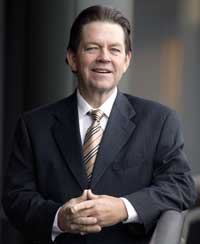[We're All Keynesians Now]
[Part 5] [previous]
Trade and Incomes Policies
At Davos, the U.S. made it clear it wanted to include "Buy American" programs in the stimulus bill.15 When I was in Britain recently, there were riots in the north about hiring foreigners instead of British workers, who were rebelling against Italians in the EEC. There is a lot of pressure in Britain as well to deviate substantially from the ideal state on trade policies.
I'd like to touch briefly on unions. But first I must remind everyone not to take their eye off all the green-friendly legislation, especially with respect to "cap and trade" and offshore drilling. As for unions, I just "loved" the first executive order by the president, a major strengthening of union activities. The president's comment was, "I do not view the labor movement as part of the problem. To me, and to my administration, labor unions are a big part of the solution." He wants to have stronger union activity, and unfortunately that is a problem for the economy.
All in all, I have never seen an economy in worse shape than the U.S. economy at this stage. It is early, and things can change and get a lot better, but frankly I don't expect that. I think things are really in terrible shape, and I expect it to continue going forward.
The States
As a final point, I would like to talk about the budget compromise in California. First, thank goodness I moved to Tennessee. I feel sorry for my old colleagues in California. The budget compromise raises the sales tax in California by one percentage point or one cent on the dollar. This will put the sales tax in Santa Clara, where my source article from the Mercury News was published, up to 9.25% from 8.25% and push the highest all-in sales tax rate in the state to over 10%. The new budget also calls for a near doubling of the vehicle licensing fee from 0.65% to about 1.15% of the market value of a car. In addition, state lawmakers passed a 0.25% surcharge on all personal income taxes. This raises California's top marginal personal state income tax from 10.3% to 10.55%. And if that's not enough, GOP lawmakers barely defeated a proposal to increase the state's gas-tax by 12 cents a gallon.16
A couple of other things are worth noting in California. The new budget will continue to require state employees to take off two Fridays a month without pay through the summer of 2010 and eliminate two of the 14 paid state holidays. The proposal was agreed upon only because a few of the Republicans abandoned their party and sided with the Democrats. The political process is starting to harden. I've been pleased with how the Republicans have stood up to the Democrats on this.
Along the same lines, I was disappointed in Arlen Specter (then R-PA) and two other Republican Senators who went along with the Obama bill.17 But frankly I am pleased that the Republicans and a number of Democrats have shown a great deal of fortitude in voting against this stimulus package, because it just makes no sense.
15. These provisions were replaced at the last minute with language that "requires only that the government spends funds in ways that do not
violate U.S. trade agreements." But it does not bode well for the prospects for future U.S. trade policy.
16. Stu Woo and Justin Scheck, "Californians Get a Budget That Leaves Few Happy," Wall Street Journal, February 20, 2009.
17. Susan Collins (R-ME) and Olympia Snowe (R-ME) are the other two.
* Arthur Laffer served as a member of Reagan's Economic Policy Advisory Board.
© 2009 Laffer Associates. Supply-Side Investment Research, March 10. All rights reserved. No portion of this report may be reproduced in any form without prior consent. The information has been compiled from sources we believe to be reliable, but we do not hold ourselves responsible for its correctness. Opinions are presented without guarantee.
